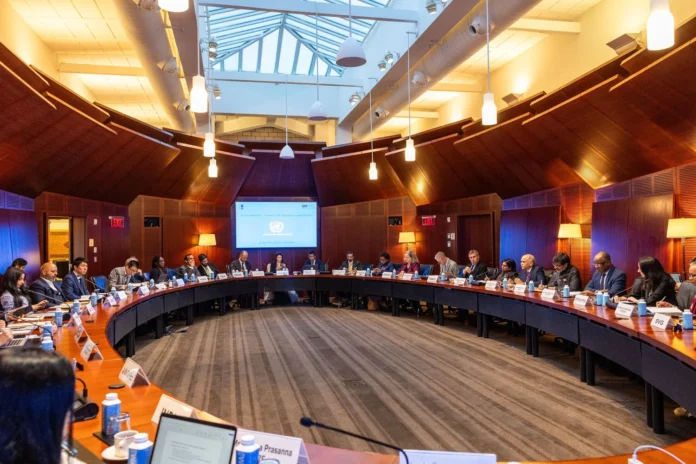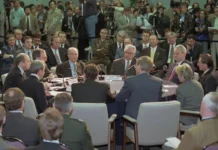Context and Significance of Security Council Reform
The United Nations Security Council (UNSC) has long served as the cornerstone of international peace and security. However, its effectiveness and legitimacy have come under intense scrutiny, particularly as the global landscape continues to evolve. The persistent inability of the UNSC to adequately address pressing conflicts and challenges has led to increasing discontent among member states and global citizens alike. Leaders such as Annalena Baerbock have emphasized that this moment presents a critical opportunity for reflection on the Council’s role in contemporary global governance.
One of the primary catalysts for the call for reform is the UNSC’s perceived failures in crisis response. The ongoing conflicts in various regions—including the Middle East, Africa, and Eastern Europe—have highlighted the Council’s limitations in fostering timely resolutions. Critics argue that the existing structure disproportionately represents the interests of a few rather than reflecting the current geopolitical realities. This discrepancy raises questions about the Security Council’s ability to earn and maintain international trust.
In response to these challenges, significant initiatives like the ‘UN80’ campaign have emerged, advocating for a more inclusive and transparent approach to global decision-making. This initiative aims to revitalize the UNSC’s credibility by engaging a broader spectrum of countries and stakeholders in discussions that shape international security policies. By promoting diversity and collaboration, the UN can bolster its global image and regain the confidence of the international community.
As the dialogue around Security Council reform intensifies, it is crucial for member states to consider the implications of their choices on the UN’s future. The need for reform goes beyond mere structural changes; it embodies a commitment to creating a more equitable and effective framework for addressing global challenges in the 21st century. Moving forward, the world must advocate for a UNSC that not only represents diverse perspectives but also embodies the principles of inclusiveness and accountability.
The Case for Reform: Legitimacy and Effectiveness
The urgent call for reform within the United Nations Security Council (UNSC) has garnered significant attention from a majority of UN member states. Reflecting on the changing dynamics of global politics, many nations have voiced their concerns regarding the legitimacy and effectiveness of the current UNSC structure, which remains unchanged since World War II. The underlying consensus is clear: the present configuration is inadequate to tackle contemporary security challenges, necessitating a reevaluation of its membership and decision-making processes.
Countries like Saint Vincent and the Grenadines and Brazil exemplify this pressing demand for reform. Saint Vincent and the Grenadines has articulated that the existing UNSC composition overlooks the voices of smaller states, resulting in a lack of adequate representation in discussions that affect their national interests directly. The call for enhanced representation is not merely a demand for equity but also a moral imperative, ensuring that all member states feel included and heard in the decision-making process. Brazil, on the other hand, emphasizes that the stalemated responses to crises due to the veto power held by a limited number of nations render the UNSC ineffective in addressing urgent threats to international peace and security.
This perception of ineffectiveness is echoed by numerous countries that attribute inaction on critical issues, such as humanitarian crises and conflicts, to the rigid structure of the UNSC. The delay in decision-making mechanisms has severe consequences, where timely interventions become increasingly challenging to implement. As such, reforming the UNSC is positioned as a means of restoring its relevance, enabling it to respond adequately to the complexities of modern global security landscapes. Ultimately, the rationale for reform is not only to enhance the legitimacy of the UNSC but also to ensure its effectiveness in promoting peace and stability worldwide.
Obstacles to Reform: Geopolitical Maneuvering and Veto Power
The challenges associated with reforming the United Nations Security Council (UNSC) are deeply rooted in geopolitical dynamics and the contentious issue of veto power. As the primary body responsible for maintaining international peace and security, the UNSC embodies a complex interplay of national interests and global governance. Notably, the presence of five permanent members—the United States, the United Kingdom, France, Russia, and China—who hold veto power, is a significant sticking point. This power allows any of these nations to block substantive resolutions, often leading to paralysis in decision-making.
Recent discussions surrounding the reform have been characterized by significant geopolitical maneuvering. For instance, representatives from countries such as Guyana and Namibia have voiced their concerns regarding the relegation of smaller nations in favor of shifting geopolitical alliances. This situation showcases a persistent struggle among nations to influence the reform agenda, often leading to outcomes that reflect the strategic interests of the more powerful states rather than a collective vision for reform. The lack of consensus on who should acquire permanent membership highlights the ongoing complexity, indicating how national agendas overshadow the broader goal of equitable representation.
The debate around the potential limitation or removal of veto power is a critical element of this discourse. While some nations, including Italy and France, advocate for retaining the veto as a necessary tool for maintaining global stability, others argue that it undermines the effectiveness and fairness of the UNSC. The Russian Federation, for instance, staunchly defends the veto’s role in safeguarding national interests, posing a significant challenge to any attempts at reform. As a result, these divergent perspectives exacerbate the inertia within the UNSC, making substantive reform a daunting prospect. The path to overcoming these obstacles is fraught with challenges; however, recognizing and addressing these geopolitical tensions is essential for any meaningful change in the Council’s governance structure.
Key Proposals for Reform and the Path Forward
The United Nations Security Council (UNSC) plays a crucial role in maintaining international peace and security. However, its composition and decision-making processes have drawn significant criticism, particularly regarding representation. Numerous proposals have emerged during discussions focusing on reforming the UNSC, emphasizing the need for enhanced representation for Africa, Small Island Developing States (SIDS), and the Global South.
One of the most prominent proposals advocates for the allocation of permanent seats specifically for African nations. This is driven by the recognition that Africa, despite its growing influence on the global stage, remains underrepresented within the UNSC. Advocates argue that permanent seats would allow African states to participate more meaningfully in discussions and resolutions that directly affect their interests and security concerns.
Additionally, representations for SIDS are being highlighted as a vital reform measure. These nations often face unique challenges such as climate change, economic vulnerability, and geopolitical marginalization. Recognizing their distinct perspectives within the UNSC would enhance the council’s ability to address issues affecting these regions effectively.
Moreover, the proposals emphasize not only the expansion of membership but also the modification of voting mechanisms to foster inclusivity. Frustration has been voiced over the protracted intergovernmental negotiation process, with many delegations calling for a shift to text-based negotiations. This shift could potentially streamline discussions and lead to more fruitful dialogues on reform.
While recognizing the complexities associated with over-representation in regional issues, the call for collaboration among member states is paramount. Moving forward with UNSC reform necessitates a collective commitment to address the historical inequities in representation, ensuring that all voices, particularly from the Global South, are heard and acknowledged in matters of international importance. The urgency for these reforms cannot be overstated, as they are integral to the credibility and effectiveness of the UNSC in the contemporary global landscape.



